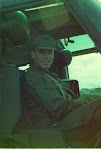I believe that every single pilot that flew helicopters in Vietnam has experienced "The Pucker Factor". For those of you who are unfamiliar with the term, let me explain.
When things get real scary, I mean REAL scary, your butt puckers so much that you don't need a seat belt. Get my drift? All kinds of situations can cause the Pucker Factor to surface. The sound of an AK 47 round hitting the skids of your helicopter will do it. So will a round coming through the dog house. Pucker Factors are not necessarily the result of combat. Other situations can induce various levels of pucker.
A compressor stall will do it, especially if it occurs when you are leaving an LZ with a full load of troops in the back of a Huey. Inexperience can produce it, if the circumstances are right. As I recall it, the first time I experienced the real deal was during a day time mission flying as Craig Wollman's copilot.
We were flying a C&C mission with the Colonel in the back. I didn't know it at the time we departed but I found out immediately that we were heading to an area where a group of our people were in contact with enemy troops not far from Phan Thiet. That's a coastal town on the South China Sea.
The Colonel gave us directions to the site of the battle but that really didn't bother me at all as we were flying at 2,500 feet and everything looked rosy to me. When we arrived at an area that Craig described as "Budda Mountain", I could see some Charlie Model gunships making gun runs. That didn't bother me all that much either.
When I saw some green tracers coming from the mountain toward the gunships, that changed things a little bit but not enough to produce the pucker. When the Colonel saw it, he told Wollman to hold west of the target so we wouldn't be flying through artillery lines of fire.
With Wollman flying at max speed, the Colonel felt that he wasn't given enough time to view the target area. It seemed that we would have to do a 180 degree turn because the battle site wasn't spread out over a very large area. Even though we were flying at a pretty high altitude, the Colonel wasn't happy with the orbit or the time he had with eyes on the target.
I don't recall overhearing any further communications between Wollman and the Colonel but I do recall what happened next. It seemed that out of nowhere, Wollman decided to STOP. That's right. I saw the cyclic coming back and watched the airspeed indicator drop to nearly nothing.
I eventually figured out that Wollman knew exactly what he was doing but to me, it seemed as though he just hovered in one place and put us in a position that gave the bad guys a stationary target to shoot at. All he was really doing was putting the aircraft in a very slow orbit that let the Colonel have all the time he wanted to direct the battle below.
Despite that, having freshly read the book in flight school about NOT doing stuff like that, the ole pucker factor hit with a power that you wouldn't believe.
Wollman eventually explained that the book I read in flight school wasn't the book he was helping to write in combat situations. I eventually figured it all out and actually adopted it when I was flying in Cambodia but I will never forget the first time I experience the Pucker Factor.
I remember it as clearly today as the day it happened and all I have to do to see it is close my eyes and think about it. I would call that a very well remembered lesson in combat tactics from a pilot that was one of the best but I think my counselor at the VA would call that post traumatic stress.
Having explained all of this, let me say that I believe the recent nightmare experience I had was an experience that was stimulated by recent articles I've read about things that are happening in our Country right now. I won't get into them now but I think it's fair to say that any shock of any kind might reconnect your brain to other shocks you've had and produce some recollections of very scary times we've experienced in the past.
In defense of my justifications for these things, let me say: "that before you judge me harshly for thoughts such as these, try to consider that my shock index might be completely different than others and in reality, me and other guys like me, are probably better suited to recognize a real shitty situation than those of you who have never had that ass pucker so tightly that you simply don't know what it's like".
Please refer to the previous post regarding "Invisible Stuff". Thanks to Craig, Terry, Dudley and Kat for the lessons learned.
Subscribe to:
Post Comments (Atom)


No comments:
Post a Comment